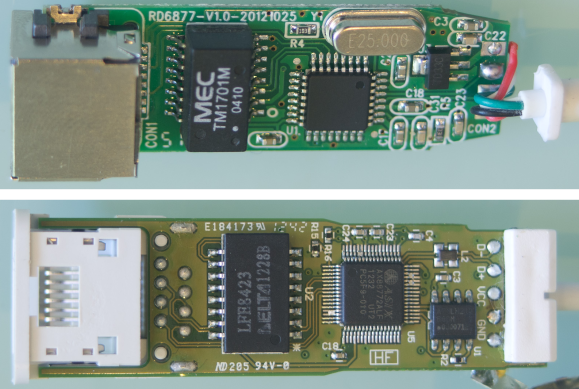
[Angus Gratton] recently cracked open a pair of USB to Ethernet converters to see what’s inside. One was an Apple branded device, the other a no-name from eBay. The former rings in at $30, with the latter just $4. This type of comparison is one of our favorites. It’s especially interesting with Apple products as they are known for solid hardware choices and the knock-offs are equally infamous for shoddy imitations.
From the outside both devices look about the same. The internal differences start right away with a whole-board metal shield on the Apple dongle and none on the off-brand. But the hardware inside is actually quite similar. There’s an RJ-45 jack on the left, followed by the Ethernet isolation chip next to it. From there we start to see differences. The off-brand had a blank chip where Apple’s ASIX AX88772ALF USB to Ethernet bridge controller is located. There is also a difference with the clock; Apple is using two crystals with the other using just one.
[via Reddit]















The cheap one is the one on top. The Reddit story points to the real story at projectgus which has more pictures and lots more discussion. One big difference that’s not visible from the top is that the Apple one has metal shielding on the bottom and the cheap one doesn’t. (Apple also uses a real OUI for the MAC address; the cheap one doesn’t.)
“In Linux they both use the driver for an “ASIX AX88772A” USB to Ethernet converter, even though the Apple one reports as “Apple” and is sold only for the MacBook Air.2”
“The cheap adapter comes with drivers for OS X & Windows, as well.”
“When I ran a TCP throughput test with iperf, they both performed well.”
I think the take away message here seems to be, though you get what you pay for, when you pay for the Apple version you are paying towards profit for a corporation that has dedicated itself to fight openness and to promote lock-in and DRM. Picking the cheapest, most cost-reduced knock-off Chinese equivalent you can find and implying it is the only alternative, isn’t doing anyone a service.
I don’t need no time-consuming teardowns. I peek at see-through $4 adapter and see all the secrets. like – it has 2 crystals, and is two-sided, and at least 2 small chips that regulate power or whatnot. can’t see name on usb converter chip though.
http://dx.com/p/usb-10-100-rj45-ethernet-network-adapter-dongle-2797
this one is realtek 10mbit only